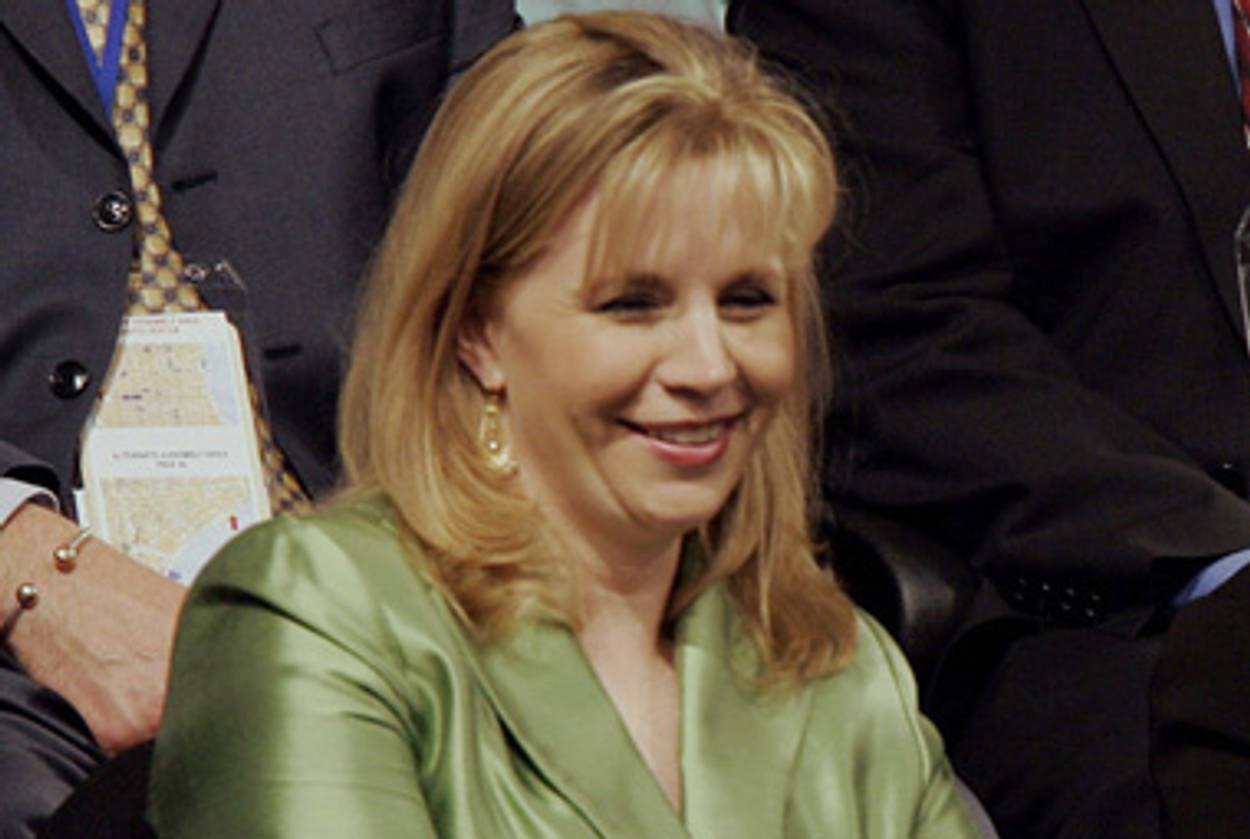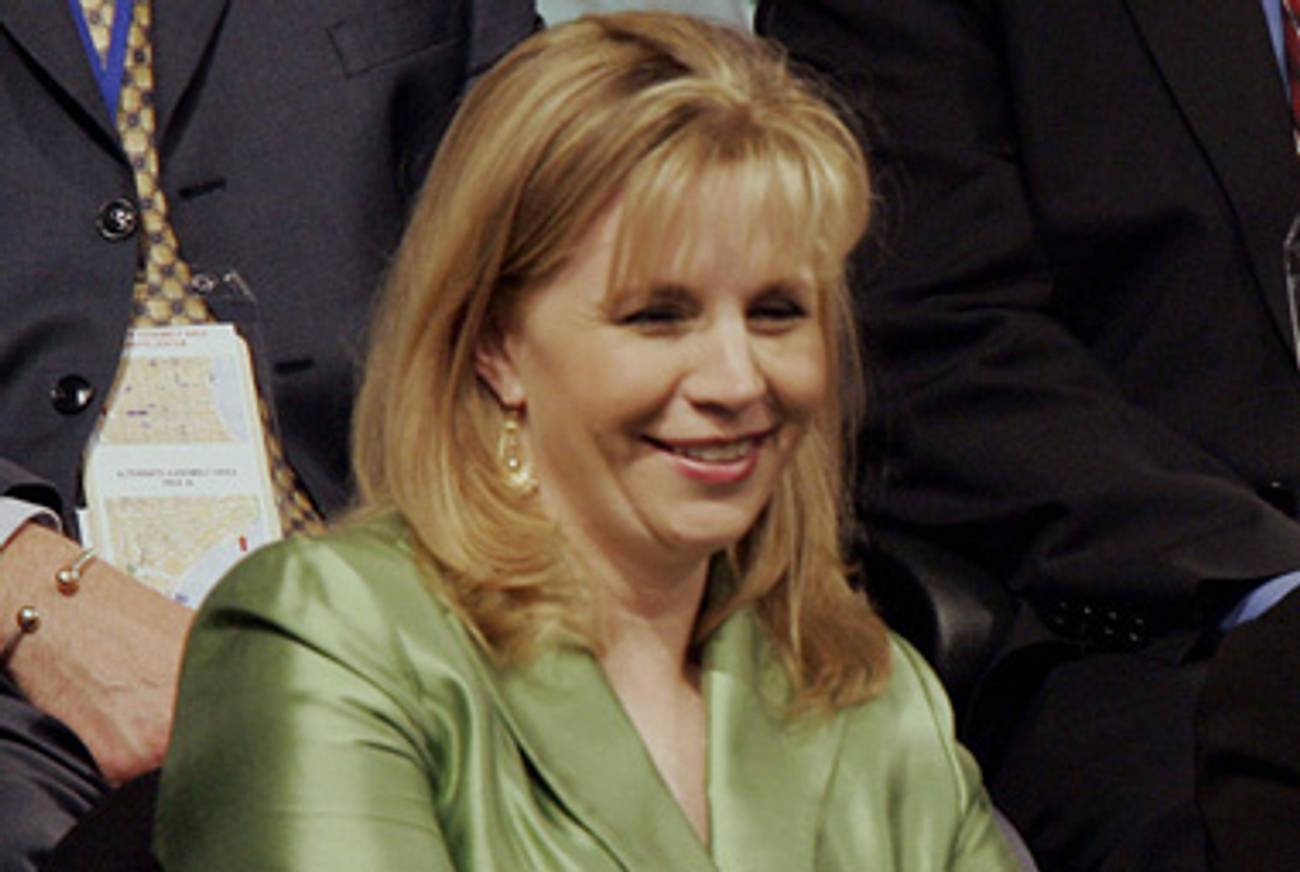Cheney Takes the Israeli ‘Political Football’ Snap
Sparring with Harman, accuses Obama of delegitimizing Israel




Liz Cheney’s remarks about President Obama at the roundtable that opened the 2012 AIPAC Policy Conference have drawn fire from Jewish Democrats who argue that the prominent Republican toyed with the bipartisan support for Israel that AIPAC treasures. Given Cheney’s reputation as a stalwart not averse to bringing out big rhetorical guns, some questioned AIPAC’s selection of her as the panel’s GOP voice opposite former Rep. Jane Harman, a Democrat.
Yesterday morning, in front of a room packed with thousands of attendees awaiting speeches by Presidents Peres and Obama, Cheney said, “Remember there are facts. There is no president who has done more to delegitimize and destabilize the state of Israel in recent history than President Obama.” (AIPAC has not yet posted a transcript or video of the panel.)
Sparring with Harman, who proceeded to defend the president’s record, Cheney responded, “Remember what President Obama said to Cairo in June? When he compared the Holocaust to the situation of the Palestinians?” Asked by moderater David Horovitz, editor of the Times of Israel, to predict what would be discussed at the AIPAC Policy Conference next year, she replied, “I predict that when we meet next year it will be to celebrate a restored relationship under a brand-new president.”
Harman had said, “Israel loses if we make it a political football in this campaign.” She also criticized the wars in Afghanistan and Iraq, both initiated by the administration in which Cheney’s father was vice president. In a contemporaneous tweet, William Daroff, Federation’s Washington director, argued that Harman started the sniping with the “football” comment: calling it a “Dem mantra,” Daroff argued, “GOP sees it as code for ‘Don’t criticize Obama for anything.’ ” Daroff acknowledged that it is also a mantra of AIPAC, which presents itself as the bipartisan pro-Israel lobby of America.
It’s true that Harman took a clearly pro-Obama line. And President Obama’s speech went beyond defending his record to criticizing the bellicose talk of the Republican contenders. However, even these attacks came couched in the context of achieving optimal policy on Iran. And nothing seemed to go quite so far as Cheney’s accusation of delegitimization, a justifiably powerful word among supporters of Israel.
Alan Solow, the last chairman of the Conference of Presidents of Major American Jewish Organizations and a longtime Obama backer close to his campaign, said yesterday, “Liz Cheney’s attack on the president today completely ignored the facts that demonstrate his strong support for Israel across the board.” He added, “The president got it right in his speech by expressing a key point which all true supporters of Israel know is true and which Liz Cheney disregarded: Support for Israel has and will continue to be bipartisan, and the politics of the election year should not cause us to abandon that fundamental principle.”
David Harris, president and CEO of the National Jewish Democratic Council, went further. “It’s disturbing in the extreme and downright disgusting for Liz Cheney to kick off the opening plenary of the AIPAC Conference with partisan, factually wrong, bashing—moments before both presidents take the podium.” The “delegitimize” remark, he said, was particularly uncalled for given the president’s repeated claim, including last September at the United Nations, that Jewish claims to the land of Israel are valid. “Even if one has a legitimate, strategic difference—air it, but say it in some respectful way,” he added.
Matthew Brooks, executive director of the Republican Jewish Coalition, dismissed the notion that what Cheney said was extraordinary, asking, “How is that any different than the president, who made, in effect, a campaign speech to the group today?” He also noted, “Many people felt that the message taken away from the Cairo speech did in fact undermine the raison d’être for the state of Israel.”
Liz Cheney did not reply to a request for comment.
The crowd responded with applause both to Cheney’s remarks and to Harman’s reply, “As I said before, I think it is a grave mistake to turn Israel into a political football.” To my hearing, the latter received a louder response.
Some noted that such talk was predictable from Cheney, who co-founded the Republican national security interest group Keep America Safe. Or, as Harris put it, “You must know what’s coming. This is the constant rhetoric she uses.”
In contrast, according to Harris, Harman, “left to her own devices, is going to talk about terrorist networks and intelligence.” Reiterating the “football” line as well as subtly attacking the previous administration and robustly the defending the present one constituted the most of Harman’s partisan rhetoric. At one point, she brought up the proliferation threat represented by Pakistan—not a common AIPAC concern. Harris noted that while Cheney runs Keep America Safe, a partisan group, Harman is in charge of the Woodrow Wilson Center, a nonpartisan, public-private international relations think tank.
Asked about Harman’s remarks in the morning session, an AIPAC spokesperson responded, “We welcome the president’s remarks and his strong resolve to work with Israel to solve the Iranian challenge.” So, somebody, anyway, was on-message.
Related: Text: Obama’s Speech in Cairo [NYT]
Obama Warns Against Loose Talk of War [NYT]
Earlier: Cheney and Harman Disagree, Within Limits
Marc Tracy is a staff writer at The New Republic, and was previously a staff writer at Tablet. He tweets @marcatracy.